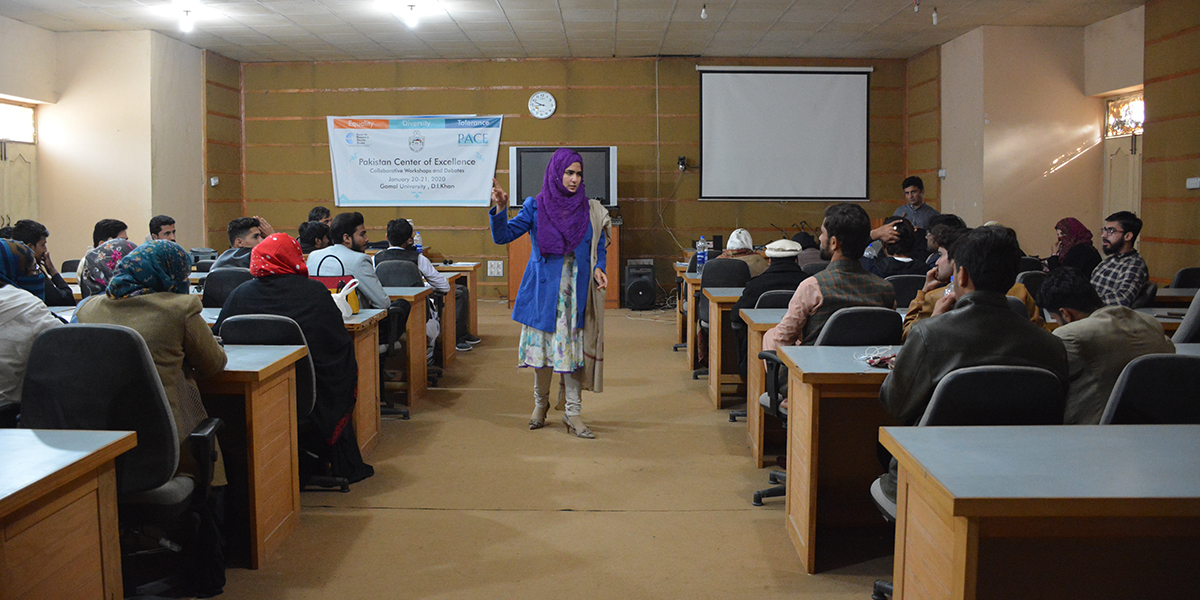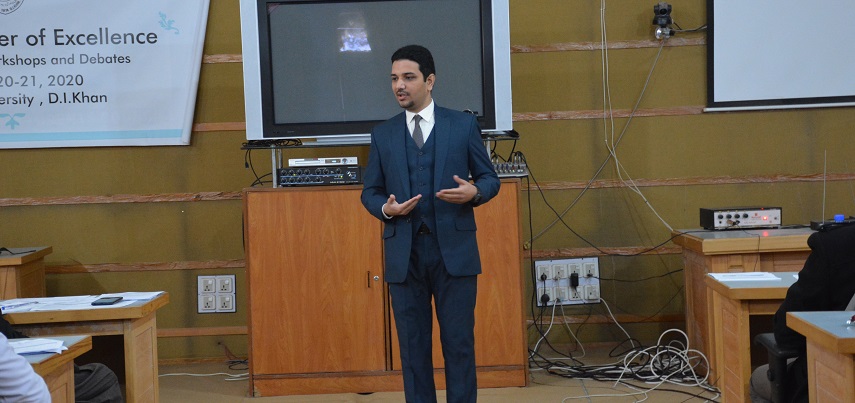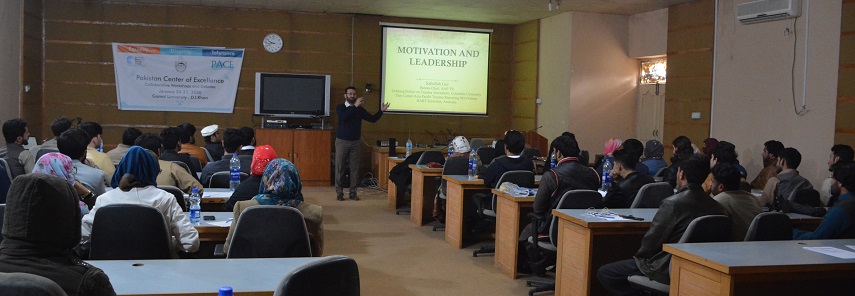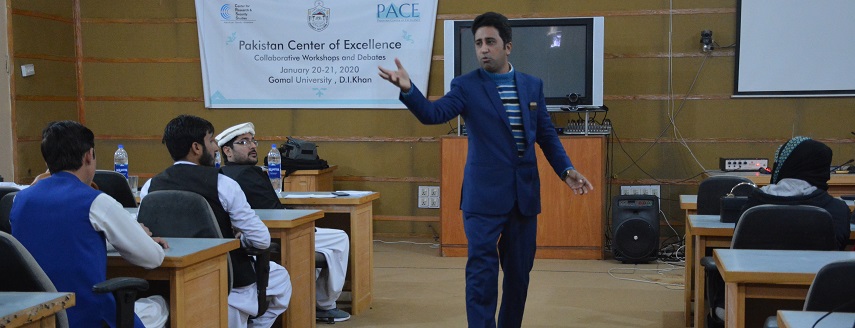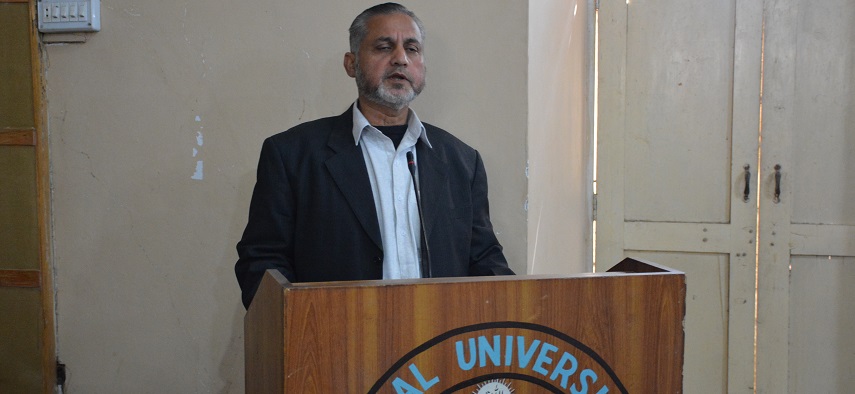The Center for Research and Security Studies (CRSS) conducted the twelveth two-day PACE Collaborative workshops and debates for university students, on January 21-22, 2020, in D.I. Khan. The workshop was held at Gomal University, D.I. Khan. It was conducted under the umbrella of the Pakistan Center of Excellence (PACE), a counter-radicalization, pluralistic values focused project, in collaboration with the Dutch Government.
Participants included students from Gomal University. Project Manager, Ms. Farhana Kanwal started off the workshop with an introductory session and welcomed the participants to the workshop. Ms. Kanwal said that PACE is a counter radicalization initiative by CRSS which was started in September, 2015 and completed its first phase in September, 2018. The core objective of PACE is to indoctrinate the habit of questioning and critical thinking among the youth of Pakistan. She added that the purpose of such activities is to bring together the youth at one platform and discuss about critical issues of multiculturalism, diversity, democracy and accountability. Youth is the shaper of future and whole objective of reaching out to them is to prepare a cadre of young people equipped with the tools of critical thinking. We believe that today’s younger generation has the ability to adopt new ideas and question preconceive narrative of intolerance. She stressed on questioning to start the process of positive transition of a society. She also stressed on including all the marginalized groups for a greater cause of peacebuilding and social cohesion. Ms. Farhana elaborated on the success and achievements of PACE in its first phase and also the objectives of PACE Evolution.
Dr. Waseem Akram Sheikh, Head of the Department of Mass Communications, Gomal University expressed his gratitude over having PACE Collaborative Workshop conducted at their university. He said that social transformation of a society takes place if we disconnect ourselves from a stipulated set of biased behaviours. Dr. Sheikh also elaborated that the objective of these workshop is not limited to gather people for two or three days but the implementation of the core values discussed at this platform needs to be implemented in our lives for collective good.
The first formal session of the day was kicked off by Mr. Saddam Hussain on ‘Rule of Law’. He started his session saying that Europe was exceptional in that the foundation of their idea of state was based less on the military power and more on their capability to dispense justice. For a state to function effectively, there must exist rule of law & all the contracts between different agents of the society should base solely on the principles of law provided by legal framework in that society. He added that every society is different, so replicating alien/foreign legal frameworks in another society will not help, but may worsen the situation. Rule of law ensures contract enforcement & secure property rights, encouraging foreign investment, creating employment, raising income levels, resultantly reducing factors that fuels violence. Mr. Hussein said that the expression of rule of law is derivative of French phrase ‘La Principe de Legality’ (the principle of legality); means that the legitimacy of the government should be based on principles of law and not on powerful men.
Mr. Safiullah Gul was the last speaker of the workshop and spoke on the topic of ‘Leadership and Motivation’. He began with the saying that “he who fails to plan actually plans to fail” and shared stories of people who alone have changed the course of history, with motivation and persistence, despite all the opposition. He said that successful leadership determines the extent of efforts directed towards a certain goal. He presented his model of goal-seeking i.e. activation, persistence and intensity. Being alone doesn’t actually matter if you have goals and objectives set in your mind. To achieve these goals, you actually need to overcome your fears and insecurities. An individual sometimes can set an example and be motivation for others.
Ms. Mahnoor Malik started off with taking points from the participants on gender equality. Discussion included the points on equal opportunities for women as available for men. Gender equality also means that women can do everything that men can do. It also means equal responsibilities which go both ways. It means sharing house chores, and the work outside the house including jobs. In Pakistani culture, child rearing is usually considered a woman’s job but then how can a woman get equal access to the opportunities if she is supposed to do the house chores and child rearing only? We cannot look at equality through a narrow lens, we need to look at it from a broader critical lens. We see that when a woman is harassed, she is silenced through various ways including defamation, character assassination, tabooing, and also asking for proofs, and if she brings up the proofs; these are often declared as fake. Women empowerment is the call of hour, we have to educate our daughters and make them able to speak for themselves, for their rights.
Dr. Akhlaq Awan started the discussion on the topic of “Tolerance and Our Culture”. He stimulated the discussion by shedding light on how people differentiate and discriminate on the basis of dress, language, living habits, customs, beliefs, traditions, and festivals. He further discussed that Pakistani society is divided on the grounds of religion, culture, language, patriarchy, and literature. He also discussed the reasons which are leading to intolerance in Pakistan as follow:
- Extremism
- Class System
- Different education system
- Un equal Unemployment opportunities
- Caste System
Dr. Waseem Akram Sheikh thanked CRSS for their peacebuilding efforts and promoting equality, diversity and tolerance during his concluding remarks. He said that we look forward to more of such seminars because it give an in-depth knowledge of the ideas that are not discussed or encouraged in our daily lives.
Ms. Farhana Kanwal closed the session with highlighting the importance of debates and critical thinking. She said that debate is a way of identifying and discussing the issues with logic and reason. She further said that an ideal society would always look beyond differences and there will be respect of rights and opinions for all with no discrimination. Ms. Kanwal also thanked the participating universities and students for their support and encouragement.

